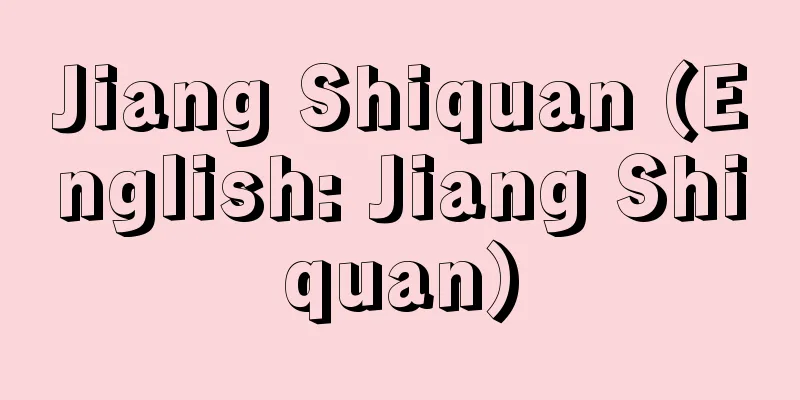Long live Senshu

|
〘Noun〙 A New Year's celebration art form rooted in ancient Japanese beliefs. A chanter descended from a medieval onmyoji (onmyoji), he would stand at the gates of various houses as a New Year's auspicious event, chanting words of praise for the family's fortune and longevity, and dancing in return for money. Also, people who make a living from it. It originated in the Middle Ages, when it was held in the front garden of the Shishinden Hall on the fourth day of the New Year, and it was also accepted by the Imperial Court, and in the early modern period, Mikawa Manzai was seen at Edo Castle, and Yamato Manzai at the Kyoto Imperial Palace. In the early Middle Ages, the performers wore sage costumes waving small pine trees, but in the later period, they changed to plain robes and Kazaori - eboshi hats, and the shite (tayu) holding a fan danced to the accompaniment of the waki (Saizō)'s drum, and exchanged words of congratulations. Senshu Manzai. 《Season・New Year》 [Shin Sarugaku-ki (c. 1061-65)] [Essay] (1) Originally, it meant a long time, and was brought over from ancient China as a word to celebrate long-lasting prosperity and longevity. It was used simply to mean "for a long time" or to express a very happy feeling. → senshuubanzei (2) Its origins as a performing art are unclear, but it is believed to have been named after the chanting of "Senshu Banzai" (Man'zai for a thousand years) in which it was performed as a celebration. Senshuu - Banzei Senshiu... [Long live Chiaki]Senshuu - Manzai Senshiu... [Long live Senshuu]Source: The Selected Edition of the Japanese Language Dictionary About the Selected Edition of the Japanese Language Dictionary Information |
|
〘名〙 日本古代の信仰に根ざす、正月の祝福芸能の一つ。中世陰陽師の流れをくむ唱門師が、正月の吉例として諸家の門に立ち、家運・長寿のほめことばなどをとなえて舞い、報酬に金銭などを得ること。また、それを業とする人々。中古、正月四日に紫宸殿の前庭で行なわれた由来により、宮中にも参入し、近世、江戸城には三河万歳が、京都御所へは大和万歳が出入りした。中世前期では小松をかざす仙人ぶりの装束が、後期から風折烏帽子(かざおりえぼし)に素袍(すおう)姿になり、扇を持ったシテ(太夫)がワキ(才蔵)の鼓に合わせて舞い、かけ合いで祝言を述べた。せんしゅうまんざい。《季・新年》 〔新猿楽記(1061‐65頃)〕[語誌](1)本来、長い年月の意で、特に永年の繁栄や長寿を祝う言葉として古く中国からもたらされ、単に幾久しいの意で用いたり、非常に嬉しい気持などを表わす語として用いたりした。→せんしゅうばんぜい。 (2)芸能としての起源は明らかではないが、そこでも祝いの言葉として「千秋万歳」と唱えられたところから命名されたと思われる。 せんしゅう‐ばんぜい センシウ‥【千秋万歳】せんしゅう‐まんざい センシウ‥【千秋万歳】出典 精選版 日本国語大辞典精選版 日本国語大辞典について 情報 |
>>: Sensugai (English spelling) crisp coral
Recommend
Housework and Sewing Department - Kajisaihouka
…One of the subjects newly established in element...
Loyal Suikoden - Chuushin Suikoden
A reading book (yomihon). Written by Santo Kyoden ...
Titration - titration
This refers to the method or procedure used in vo...
Staphylococcus (Budokyukin) (English spelling) Staphylococcus
Also called staphylococcus. A gram-positive, spher...
Yoshisuke Totsugi - Tetsugyokai
A Soto sect monk from the Kamakura period. Born i...
Armignon, VF - Armignon
…Italian Literature [Kazuhiro Hayashi] [Risorgime...
Northern Coalsack - Kitano Coalsack
...Dense parts that indicate the birth of future ...
Kaolin
A fireclay composed of kaolin minerals (kaolinite...
Philips (English spelling) Koninklijke Philips NV; Royal Philips
The largest general electronics manufacturer in Eu...
The Interconfessional Translation of the Bible
...The holy book of Judaism and Christianity. The...
Waterman, LE (English spelling) WatermanLE
…The English word fountain pen was used in the 18...
Listed products - jojoshohin
Commodities that are traded on the commodity excha...
Hiratsuka Unichi - Hiratsuka Unichi
Printmaker. Born in Matsue, Shimane Prefecture. I...
Sequoia
...This is probably due to the extinction of spec...
Sabafugu (Mackerel pufferfish) - Lagocephalus lunaris
A marine fish of the Tetraodontiformes order, Tetr...









![Dhrupad (English spelling) [Hindi]](/upload/images/67cc5f526d749.webp)